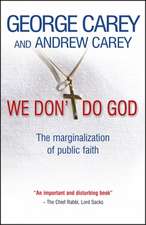The Spiritual Gospel: The Interpretation of the Fourth Gospel in the Early Church
Autor Maurice F. Wilesen Limba Engleză Paperback – 15 mar 2006
Preț: 329.56 lei
Nou
Puncte Express: 494
Preț estimativ în valută:
63.06€ • 66.02$ • 52.18£
63.06€ • 66.02$ • 52.18£
Carte tipărită la comandă
Livrare economică 05-19 aprilie
Preluare comenzi: 021 569.72.76
Specificații
ISBN-13: 9780521673280
ISBN-10: 0521673283
Pagini: 196
Dimensiuni: 138 x 215 x 11 mm
Greutate: 0.25 kg
Editura: Cambridge University Press
Colecția Cambridge University Press
Locul publicării:Cambridge, United Kingdom
ISBN-10: 0521673283
Pagini: 196
Dimensiuni: 138 x 215 x 11 mm
Greutate: 0.25 kg
Editura: Cambridge University Press
Colecția Cambridge University Press
Locul publicării:Cambridge, United Kingdom
Cuprins
Acknowledgements; Abbreviations; Introduction Commentaries and commentators; 1. The authorship and purpose of the Gospel; 2. The Fourth Gospel and the Synoptic Gospels; 3. Historicity and symbolism; 4. The signs; 5. Leading ideas of the Gospel; 6. The Fourth Gospel and the Gnostics; 7. Christological interpretation in the third and fourth centuries; 8. The Christological exegesis of Theodore and Cyril; 9. The Gospel of salvation; Epilogue - An assessment; Bibliography; Indexes.
Descriere
This book surveys the Greek fathers' interpretations of the Gospel of John from the earliest surviving commentary (Heracleon, c. 170) up to the early fifth century.













